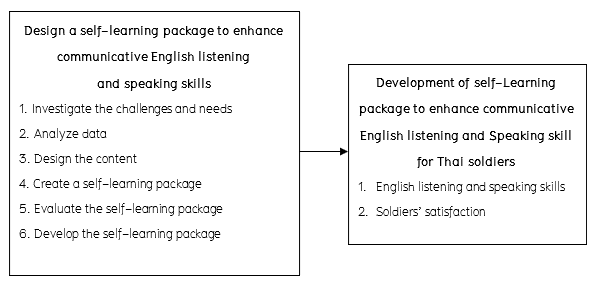Development of Self-Learning Package to Enhance Communicative English Listening And Speaking Skills for Thai Soldiers
Main Article Content
Abstract
The main objectives of this research were to: 1) investigate Thai soldiers’ challenges and needs in terms of their communicative English skills; 2) develop a self-learning package to enhance English listening and speaking skills of Thai soldiers; and 3) evaluate the level of the soldiers’ satisfaction as it pertained to this self-learning package. The sample group in this research comprised of 100 soldiers from eight provinces in the upper northern Thailand, who voluntarily contributed to this study. The research instruments consisted of questionnaires relating to the Thai soldiers ' needs as it pertained to their communicative English skills, a self-learning package designed to develop the soldiers’ listening and speaking skills, and a survey on the soldiers’ satisfaction with the learning package itself. The quantitative data from the questionnaire and the satisfaction form were then analyzed to find the mean and standard deviation (S.D.).
The results revealed that 1) the topics the soldiers wanted to learn and what they found to be challenging when communicating in English were relevant to their job and daily use of English. 2) The learning package of this study, consisting of a booklet and a Computer Assisted Instruction (CAI), was developed effectively and successfully. The booklet and the CAI comprised five units to include; Introducing oneself, Handling basic commands, Giving directions around the military installation facilities, Asking for and giving permission, and Carrying on daily military conversations. 3) The satisfaction of the Thai soldiers with the package was indeed positive at a high level.
Downloads
Article Details

This work is licensed under a Creative Commons Attribution-NonCommercial-NoDerivatives 4.0 International License.
References
Abba, H. M., Mustapha, M. A., & Ali, H. (2019). Use of computer assisted instruction to improve students’ reading skill in English language. Journal on English Language Teaching, 9(1), 32-37. Retrieved from https://files.eric.ed.gov/fulltext/EJ1214406.pdf
Anthony, L. (2018). Introducing English for specific purposes. New York, NY: Routledge. ASEAN Secretariat. (2015). ASEAN community. Jakarta: ASEAN Secretariat.
Asrifan, A., Zita, C., Vargheese, K., T., S., & Amir, M. (2020). The effects of CALL (Computer Assisted Language Learning) towards the students’ English achievement and attitude. Journal of advanced English studies, 3(2), 94-106. Retrieved from https://doi:10.47354/jaes.v3i2.88
Chaichompoo, P. (2019). Impact of subtitles in audiovisual media on English learning. Journal of Liberal Arts, Maejo University, 7(1), 200-213. Retrieved from https://so03.tci-thaijo.org/index.php/liberalartsjournal /article/view/199358/139112
Ho, Y.Y., Lim, W.Y.R. (2020). Educating adult learners: Bridging learners’ characteristics and the learning sciences. In Sanger, C., Gleason, N. (Eds), Diversity and inclusion in global higher education. (pp. 97-115). Retrieved from https://doi.org/10.1007/978-981-15-1628-3_4
Krungkraipetch, K. (2019). Sex Ed. CAI creation for young teen in Thailand. Thammasat Medical Journal, 19(3), 502-518. Retrieved from https://he02.tci-thaijo.org/index.php/tmj/article/view/237776/162812
Laksana, S. (2016). Instrumentation. Retrieved from http://www.education.au.edu/wp-content/uploads/ 2016/09/instrumentation.pdf
LeJeune, L. M., & Lemons, C. J. (2021). The effect of computer-assisted instruction on challenging behavior and academic engagement. Journal of Positive Behavior Interventions, 23(2), 118–129. Retrieved from https://doi.org/10.1177/1098300 720929680
Murtonen, M. & Lehtinen, E. (2020). Adult learners and theories of learning. In Kallio, E.K. (Eds.), Development of adult thinking: Interdisciplinary perspective on cognitive development and adult learning (pp. 97-122). New York: Routledge.
Nuemaihom, A. (2019). Need analysis of English for specific purposes (ESP) for 7-eleven employees: A case study in Buriram province. Research and Development Journal Suan Sunandha Rajabhat University, 9(Supplement), 96-104. Retrieved from https://so05.tci-thaijo.org/index.php/irdssru/article/view/213884
Oludeyi, O. S., Erinsakin, M. O., & Omotayo, O. T. (2018). Application of modern techniques in adult learning process. In Kola, K., Kofo,A. A., Olufunke, T. O., & Margaret, B. O (Eds.), Understanding adult education practice in Nigeria: Essays in honor of Professor Kehinde Oluwaseun Kester (pp. 252-267). Retrieved from https://www.researchgate.net/publication/334962940
Porntheerapat, N., Promchot, P., Sudprasert, C. & Yaungyim N. (2021). Effect of the using of computer-assisted instruction media and caring manual on quality of care and satisfaction perceived by open-heart surgery children caregivers at QSNICH. Journal of The Department of Medical Services, 46(1), 243–251. Retrieved from https://he02.tci-thaijo.org/index.php/JDMS/article/view/251893
Promton, M., Wangsrikhun, S. & Sukonthasarn, A. (2019). Effective of using computer assisted instruction for emergency department triage on nurses’ triage accuracy. Nursing Journal, 46(1), 65-75.
Promwatcharanon, K. & Chatreepinyo, P. (2018). An analysis of challenges and requirements of using communicative English for developing a self-access learning package for traffic police officers in upper northern Thailand. Humanities & Social Sciences, 35(1), 163-195.
Rahman, A. (2020). Need analysis in the development of English for specific purposes learning in students of STIA Prima Bone administration study program. Journal of Studies in Education, 10(4), 76-93. Retrieved from https://www.macrothink.org/journal/index.php/jse/article/view/17701
Ramdha, T. & Fionasari, R. (2019, September). Needs analysis as a first step designing English for specific purposes programs. In CELSciTech International Conference, Pekanbaru, (pp. 5-9). 26th September 2019. Indonesia: Universitas Muhammadiyah Riau.
Riansiri, P. (2013). The English skills development of the army officers of 33rd military circle for ASEAN community access. (Master of Arts thesis, Political Science Chiang Mai University).
Sari, R. K., Kuncoro, A., & Erlangga, F. (2019). Need analysis of English for specific purposes to informatics students. Journal of English Education, Linguistics and Literature, 5(2), 26-37. Retrieved from https://doi.org/ 10.32682/jeell.v5i2.986
Suyaai, K. (2018). English communication problems and needs of ESP learners: A case study of Songthaew drivers in Chiang Mai. FEU Academic Review Journal, 12(Supplement), 150-165.
Tennant, M. (2019). Psychology and adult learning: The role of theory in informing practice. (4th ed.). London: Routledge.
Thinrat, A. (2020). Need analysis and English for specific purposes (ESP) course development for the staff of Buriram Airport. (Master of Arts thesis, English Buriram Rajabhat University).
Woodrow, L. (2018). Introducing course design in English for specific purposes. New York: Routledge.
Yoswarissakul, Y. (2020). Promoting self - directed learning of Moken students in Moken community center in Pangnga province using computer assisted instruction (CAI). Journal of Education, Prince of Songkla University, Pattani Campus, 30(3), 135–147. Retrieved from https://so02.tci-thaijo.org/index.php /edupsu/article/view/233875


